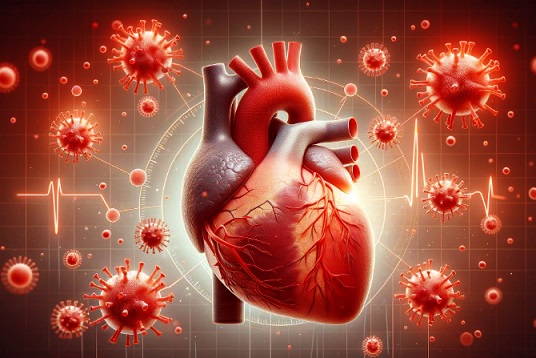Austrian Study Finds That SARS-CoV-2 Omicron Strains Exhibits Greater Cardiotropism Than Previous Variants!
Nikhil Prasad Fact checked by:Thailand Medical News Team Dec 19, 2024 3 months, 3 weeks, 4 days, 6 hours, 39 minutes ago
Medical News: A groundbreaking study conducted by researchers at the Medical University of Innsbruck, Austria, has revealed alarming new findings about the impact of SARS-CoV-2 Omicron variants on the cardiovascular system. The research, which compared the effects of the Omicron variant against earlier variants such as the wild-type and Alpha, has shed light on the heightened cardiotropism - and heart-specific effects - of the Omicron strain. These findings have significant implications for understanding COVID-19’s evolving impact on human health.
 Austrian Study Finds That SARS-CoV-2 Omicron Strains Exhibits Greater Cardiotropism Than Previous Variants
A Closer Look at the Study
Austrian Study Finds That SARS-CoV-2 Omicron Strains Exhibits Greater Cardiotropism Than Previous Variants
A Closer Look at the Study
The study, led by a team of experts including Francesco Robert Burkert, Martina Oberhollenzer, Daniela Kresse, Sarah Niederreiter, Vera Filippi, Lukas Lanser, Günter Weiss, and Rosa Bellmann-Weiler, was based at the Department of Internal Medicine II at the Medical University of Innsbruck. Their work builds on the growing body of evidence suggesting that COVID-19 impacts not only the respiratory system but also multiple organ systems, including the heart.
This
Medical News report dives deep into their single-center retrospective cohort analysis, which assessed 535 patients hospitalized with COVID-19 during two distinct pandemic waves. The researchers compared biomarkers and clinical outcomes between patients infected with the wild-type or Alpha variant (wt/Alpha) and those with the Omicron variant. The data offers a clearer understanding of the variant’s increased predilection for causing heart damage.
Key Findings from the Study
The study revealed significant differences in cardiac involvement between the groups:
-Biomarkers of Cardiac Stress: Patients infected with the Omicron variant exhibited markedly higher levels of high-sensitivity Troponin-T (hs-TnT) and N-terminal prohormone of brain natriuretic peptide (NT-proBNP), which are biomarkers associated with cardiac injury and stress. Specifically, the median hs-TnT levels for the Omicron cohort were 27.8 ng/L, compared to 12.8 ng/L in the wt/Alpha cohort. Similarly, NT-proBNP levels in the Omicron group reached a median of 825 ng/L versus 256 ng/L for wt/Alpha patients. These findings were statistically significant (p < 0.001).
-Impact Across Age Groups: Notably, the increased cardiac biomarker levels in the Omicron cohort persisted even among younger patients (under 65 years) and those without pre-existing cardiovascular disease. For instance, in this subgroup, median hs-TnT levels were 8.6 ng/L for Omicron patients, compared to 6.1 ng/L in the wt/Alpha cohort.
-Comorbidities and Mortality: Although the Omicron cohort had a higher prevalence of pre-existing cardiovascular and chronic kidney diseases, the in-hospital mortality rates were not significantly different between the two groups (Omicron: 7.7% vs. wt/Alpha: 12.7%, p = 0.132
). This finding highlights the variant’s specific cardiac tropism rather than generalized disease severity.
Broader Implications of Cardiotropism
The study’s results underscore the evolving nature of SARS-CoV-2 and its variants. Earlier variants such as Alpha and Delta were primarily associated with severe respiratory complications. However, Omicron’s propensity to target the heart raises concerns about long-term cardiovascular consequences in affected patients.
Researchers suggest that the Omicron variant’s heightened cardiotropism might be due to its efficiency in infecting and damaging cardiomyocytes (heart muscle cells). This could involve direct viral invasion, inflammation-induced damage, and microthrombi formation, which compromise heart function. Importantly, these mechanisms were found to occur independently of the inflammatory marker C-reactive protein (CRP), indicating a unique mode of action.
Comparing the Omicron and wt/Alpha Groups
In addition to cardiac biomarkers, the study evaluated other factors such as intensive care unit (ICU) admission rates. Patients infected with the wt/Alpha variants were more likely to require ICU care (22.2%) compared to those with Omicron (12%, p = 0.014). This finding suggests that while Omicron infections may be less severe overall, their specific effects on the heart warrant closer attention.
Subgroup Analyses
The researchers conducted detailed subgroup analyses to rule out confounding factors such as age, renal function, and pre-existing conditions. Even among patients with normal renal function (eGFR > 60 mL/min), the Omicron cohort had significantly higher hs-TnT levels (15.7 ng/L vs. 8.9 ng/L for wt/Alpha, p < 0.001). This pattern persisted in younger patients without cardiovascular disease, reinforcing the variant’s unique cardiotropic characteristics.
Study Limitations and Considerations
While the findings are compelling, the study acknowledges several limitations. These include the single-center design, which may limit generalizability, and the potential confounding effects of vaccination and antiviral therapies introduced during the study period. For instance, vaccines and treatments like remdesivir and nirmatrelvir - ritonavir became widely available during the later stages of the pandemic, potentially influencing outcomes.
Additionally, the authors highlight the need for further research to elucidate the molecular mechanisms underlying Omicron’s cardiotropism. Understanding these pathways could pave the way for targeted interventions to mitigate cardiovascular risks in COVID-19 patients.
Conclusions
The Austrian study provides crucial insights into the evolving nature of SARS-CoV-2 and its impact on human health. By demonstrating that the Omicron variant exhibits greater cardiotropism than earlier strains, the research highlights the need for heightened vigilance and tailored management strategies for COVID-19 patients.
The findings also underscore the importance of cardiac monitoring in patients with Omicron infections, even in younger, healthier individuals. As the virus continues to mutate, clinicians and researchers must remain proactive in addressing emerging challenges and mitigating long-term complications.
In conclusion, this study serves as a stark reminder that while SARS-CoV-2 variants may vary in severity, their ability to cause specific organ damage - such as cardiac injury - should not be underestimated. Future studies should focus on unraveling the molecular mechanisms driving this cardiotropism and developing strategies to protect vulnerable populations.
The study findings were published in the peer-reviewed journal: Microorganisms.
https://www.mdpi.com/2076-2607/12/12/2617
For the latest COVID-19 News, keep on logging to Thailand
Medical News.
Read Also:
https://www.thailandmedical.news/news/study-reveals-neurological-dangers-of-mild-omicron-subvariants
https://www.thailandmedical.news/news/compared-to-earlier-sars-cov-2-variants,-omicron-causes-a-greater-degree-of-dysbiosis-of-the-intestinal-microbiota
https://www.thailandmedical.news/news/breaking-covid-19-news-study-finds-that-omicron-variants-have-a-unique-ability-to-induce-cellular-senescence
https://www.thailandmedical.news/news/covid-19-news-pediatricians-in-japan-warn-that-omicron-variants-are-causing-high-number-of-seizures-and-unconsciousness-in-infected-children
https://www.thailandmedical.news/news/covid-19-news-study-finds-that-omicron-variants-causes-outcomes-in-blood-platelets-similar-to-delta-if-not-worse-but-via-different-mechanisms
https://www.thailandmedical.news/news/breaking-news-sars-cov-2-delta-and-omicron-variants-display-enhanced-resistance-to-uv-light-compared-to-original-wuhan-strain
https://www.thailandmedical.news/news/breaking-scientists-discover-that-sars-cov-2-omicron-variant-harbors-a-unique-insertion-mutation,-ins214epe-of-unknown-putative-genomic-origin
https://www.thailandmedical.news/news/breaking-news-omicron-sublineages-could-be-using-a-new-viral-invasion-strategy-with-multiple-types-of-matrix-metalloproteinases
https://www.thailandmedical.news/news/breaking-news-chinese-scientist-raises-alarm-on-newly-emerging-omicron-sublineages-alarming-trend-of-escalating-cellular-infectivity
https://www.thailandmedical.news/news/covid-19-news-canadian-study-finds-that-omicron-is-causing-more-health-issues-in-children-contrary-to-the-fallacy-that-omicron-is-mild
https://www.thailandmedical.news/news/eeg-patterns-reveal-psychiatric-risk-after-sars-cov-2-omicron-infection
https://www.thailandmedical.news/news/liver-stress-detected-in-mild-and-asymptomatic-omicron-cases
https://www.thailandmedical.news/news/omicron-variants-with-g252v-mutation-show-greater-impact-on-t-cells-and-b-cells
https://www.thailandmedical.news/news/japanese-study-reveals-that-omicron-variants-prefer-endosomal-cathepsin-l-for-viral-entry-over-tmprss2
https://www.thailandmedical.news/news/rbd-of-sars-cov-2-omicron-sub-lineages-targets-siglec-9-to-decrease-its-immunogenicity-by-preventing-macrophage-phagocytosis
https://www.thailandmedical.news/news/study-shockingly-shows-that-many-exposed-to-the-sars-cov-2-omicron-variant-exhibit-hematuria-and-proteinuria-early-signs-of-possible-kidney-damage
https://www.thailandmedical.news/articles/coronavirus
